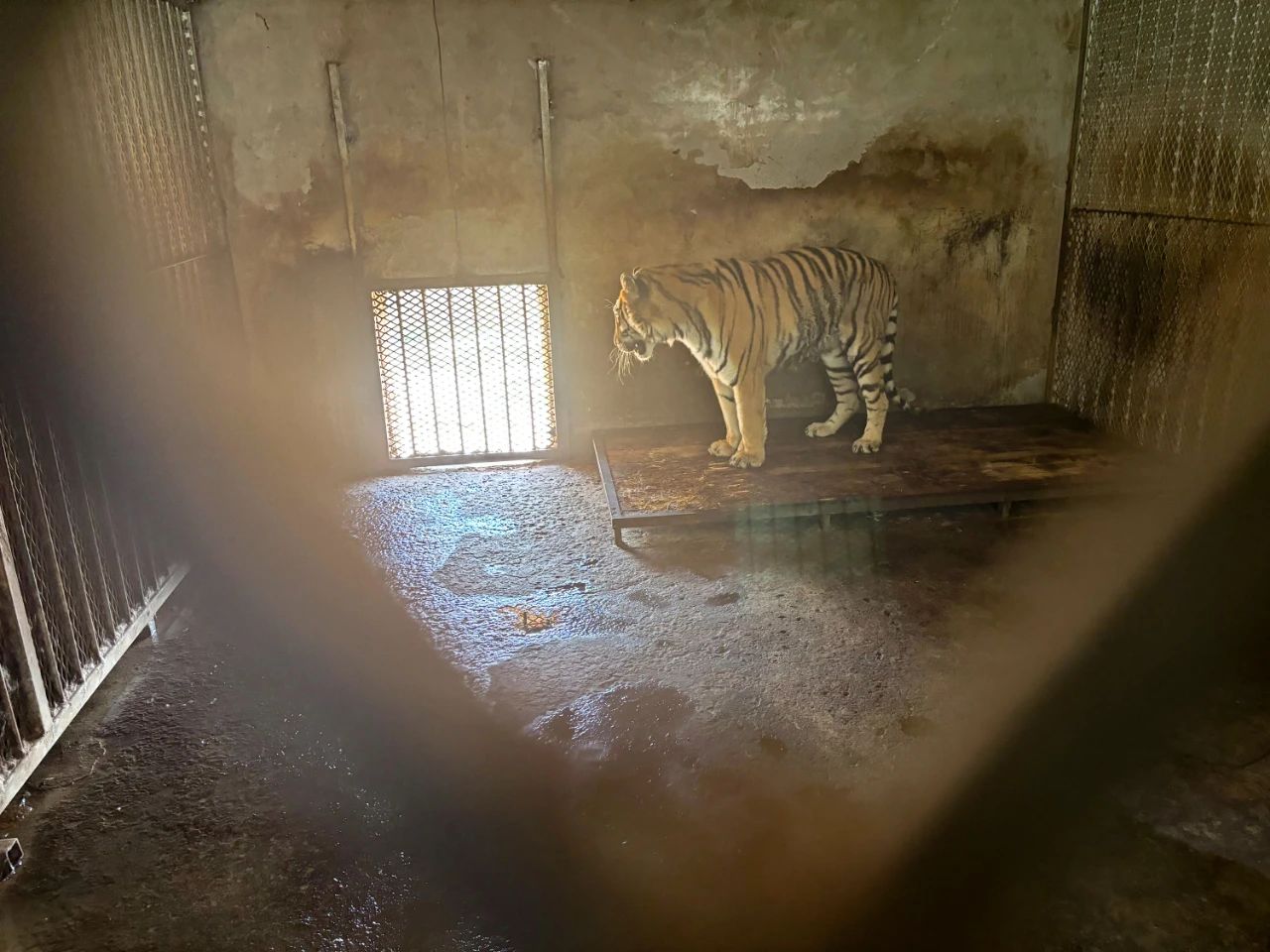
A Siberian tiger is kept in a small room in the wild animal park in Fuyang, East China’s Anhui Province. Photo: China Philanthropist
A wild animal park in Fuyang, East China’s Anhui Province on Monday announced it was suspending operations for three days, following reports of multiple abnormal deaths of animals in the park, including 20 Siberian tigers in recent years. The reports have sparked public concern and discussions on animal protection, with many calling for better treatment of animals.
It was found that the wild animal park illegally showcased and artificially reproduced the Siberian tiger, an animal that comes under national first-class protection, without obtaining a permit, the China Philanthropist magazine reported. The living conditions of the animals in the park were extremely poor, with many kept in small cages for years, leading to physical disabilities. An ownership dispute has also resulted in the deaths of many wild animals, including 20 Siberian tigers, two African lions, and three giraffes, according to the report.
From October 2019 to March 2023, a total of 10 Siberian tigers died, while from June 2020 to August 2023, a total of 11 Siberian tiger cubs were born, with only one surviving, said the report.
After media revealed the incidents, the topic triggered a wide discussion on Chinese social media, reaching more than 43 million views on Chinese X-like Sina Weibo, with many netizens calling for a thorough investigation and better treatment for animals.
“Looking at the picture is heartbreaking. These animals should be living freely in the vast grasslands and forests. They are living in dark and cramped areas. How can they grow well in such conditions? If we can’t take care of them properly, we should find another way. If this continues, what will be the fate of the remaining animals?” one netizen wrote.
The animals live in a bad environment. The illegal breeding must be seriously investigated and punished, another said.
Following the media reports, Fuyang city authorities have established an investigation team to conduct a comprehensive probe into the deaths of wild animals. The follow-up investigation and results will be promptly disclosed to the public, the Fuyang authorities said on Monday.
Fuyang resolutely protects all kinds of wild animals in accordance with the law and regulations, and severely punishes illegal activities that harm them. Those responsible will be held accountable, said the authorities.
Due to the hot weather, some venues in the park are undergoing upgrades. The park will be closed from Monday to Wednesday, and will reopen on Thursday, the wild animal park said.
The park is a privately owned zoo operated by Anhui Qicai Wildlife Park Co. In April 2018, the company signed a contract with Fuyang Tengfei Domestication Performance Co, under which the latter transferred 33 Siberian tigers, five African lions, 11 bears, three camels, and other animals to Qicai for a total price of 2.543 million yuan ($351,559), China Philanthropist reported.
However, according to Tengfei’s legal representative Li Lianghua, in April 2019, when Tengfei transported 25 tigers from Shanghai to Fuyang, they found that the zoo had halted construction. “When I saw that the environment was completely unsuitable for the Siberian tiger to survive in, I did not dare to send any more tigers over,” Li said, according to the report.
The park features various natural landscape and entertainment interactive sections, with different areas for Asian herbivores such as sika deer and white deer, African herbivores such as giraffes and zebras, and other animals including Siberian tigers, white lions, and leopards, according to public information by the local tourism authorities.
There are currently about 60 wild Siberian tigers in China, compared to about 20 in the 1990s, according to the National Forestry and Grassland Administration in July 2023.
China’s Law on the Protection of Wildlife states that living conditions for artificially bred wild animals should be in accordance with their natural habits, and ensure they have necessary space for activities, reproduction, and health. The facilities and technologies used for breeding should be appropriate for the species and scale of development, meeting relevant technical standards and disease prevention requirements. Wild animals should not be mistreated, according to the law.
Global Times




